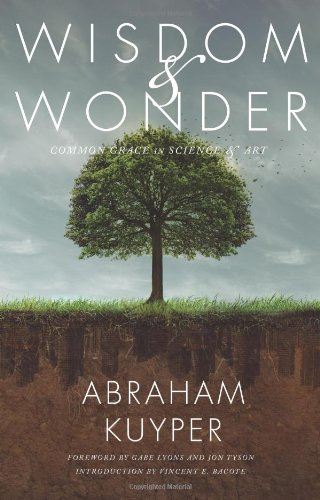Book review: Wisdom and Wonder
by Abraham Kuyper
★★★★★
Abraham Kuyper (1837-1920) penned this book in 1905, and it later became part of a three-volume set on the topic of Common Grace. This is the first translation into English from the original Dutch.
Kuyper reads the Bible literally, in particular the Garden of Eden and mankind’s fall, and ponders some provoking issues about what the Fall meant for the development of science and art. His writing, while dated and in many places relevant only to the most conservative Christian, is intelligent and opinionated, and the translation is elegant. It’s a pleasure to read.
Kuyper sees Adam’s fall from grace as a major setback in both science and art, and the beginning of human attempts to recapture the beauty of both. Never can we approach what we once shared in paradise, nor can we begin to imagine the beauty of the world to come, but God has been gracious in awarding us at least a little glimpse of the beauty of his creation, through the avenues of science and art.
Both can be misused, of course. It requires a proper Christian outlook to remain on track, lest we fall into the dangers of Darwinian thinking or (shudder) nude modeling. Certainly the charm of this book is its antiquated quaintness, while simultaneously uncovering Kuyper as a profound theologian. The translation is superb, a perfect tone for the discussion.
Whether you are a conservative seeking comfort in old time religion or a historian of post-enlightenment Christianity, this book is a gem.












 354 Circles
354 Circles
 603 Goodreads Friends & Fans
603 Goodreads Friends & Fans

 Hello! I'm an author, historical Jesus scholar, book reviewer, and liberal Christian, which means I appreciate and attempt to exercise the humanitarian teachings of Jesus without getting hung up on any particular supernatural or religious beliefs.
The Bible is a magnificent book that has inspired and spiritually fed generations for thousands of years, and each new century seems to bring a deeper understanding of life’s purpose. This is true of not only Christianity; through the years, our age-old religions are slowly transforming from superstitious rituals into humanitarian philosophies. In short, we are growing up, and I am thrilled to be riding the wave.
I avidly read all thought-provoking religion titles. New authors: I'd love to read and review your book!
Hello! I'm an author, historical Jesus scholar, book reviewer, and liberal Christian, which means I appreciate and attempt to exercise the humanitarian teachings of Jesus without getting hung up on any particular supernatural or religious beliefs.
The Bible is a magnificent book that has inspired and spiritually fed generations for thousands of years, and each new century seems to bring a deeper understanding of life’s purpose. This is true of not only Christianity; through the years, our age-old religions are slowly transforming from superstitious rituals into humanitarian philosophies. In short, we are growing up, and I am thrilled to be riding the wave.
I avidly read all thought-provoking religion titles. New authors: I'd love to read and review your book!
 Hi! While Lee writes the articles and reviews the books, I edit, organize, and maintain the blog. The views expressed here are Lee's but I'm his biggest supporter! :-)
Hi! While Lee writes the articles and reviews the books, I edit, organize, and maintain the blog. The views expressed here are Lee's but I'm his biggest supporter! :-)
Paradise returns in the second Adam for those of us who believe. Getting back to Eden is not that difficult if as Paul writes, “I knew a man, whether he was in the body or out of the body, I do not know” translates into common practice. Not knowing which state you are in, or out, is the result of the habit of being enraptured through worship. It is like being caught up as John was after he was brought into the throne room of heaven. Out of body experiences for Christians? Imagine that!!!
certain people appear more adept at experiencing the mystical, but it does not appear to be a skill easily taught, nor a heavenly gift awarded to everyone. So, I’m not certain “common practive” is descriptive.
One thing I learned in researching for my book on Revelation: The final book of the Bible is a bewilderingly deep theological work compiled with dozens of scripture scrolls unrolled on his writing table. The scriptural references are legion. So, do we continue to imagine Revelation as a sort of heavenly dictation, or do we see it as a literary masterpiece of careful divising, or both?
mysticists will embrace John’s “out of body experience” while scholars will admire his theological masterpiece.
Interesting review, I want to read it!
“Darwinian thinking or (shudder) nude modeling…” I love your reviews!